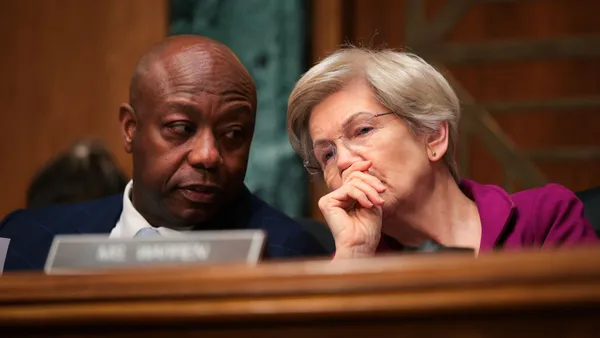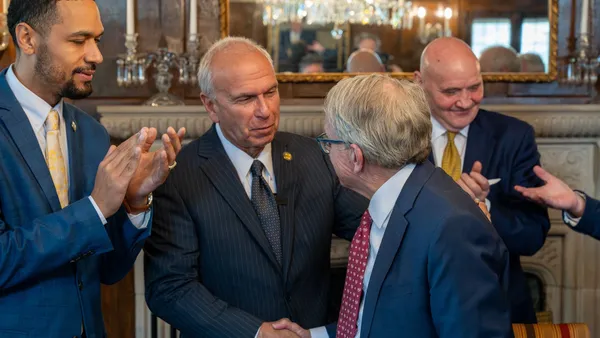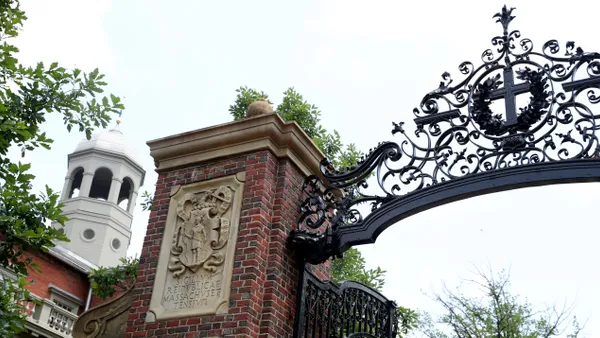This story is ongoing and the timeline will be updated as events unfold.
In the fall of 2017, the faith-based nonprofit Dream Center Foundation entered the higher education world when it acquired the college assets of the for-profit Education Management Corp. (EDMC). The deal included the Art Institutes, a chain of for-profit art colleges that traces its roots back nearly a century.
The deal was a disaster, almost from the moment the ink dried. Enrollment and revenue fell far short of EDMC's projections, and Dream Center lost accreditation for some of its schools. By the end of 2018, Dream Center Education Holdings (DCEH), a nonprofit set up to manage the acquired colleges, was facing insolvency and looking to get rid of most of its higher ed assets.
The organization successfully unloaded eight of its remaining Art Institutes and most of the South University system, while deals to purchase the campuses it kept in receivership have since fallen through. The latter group includes a handful of Art Institutes, Argosy University and two South University campuses.
Meanwhile, DCEH's efforts to reorganize in receivership have gone terribly by almost every measure, with Argosy losing its Title IV access amid a scandal around unpaid federal student aid stipends. A round of sudden campus closures soon followed.
Students and employees have paid the price in lost money and time, as well as in stress and uncertainty. As stakeholders continue searching for answers and the organization's remaining assets are addressed in receivership, the story of DCEH's failure serves as a cautionary tale for when colleges with troubled histories go up for sale.
To help track these complexities, we've outlined some of the key events in a story that is still unfolding.
Jump to a point on the timeline by clicking on a major event below.
⬆- Pre-2000 The early years
- 2006 Private equity steps in
- 2017 EDMC acquired
- 2018 Fallout begins
- January 2019 Receivership starts
- March 2019 Campuses close
Pre-2000
The early years
1921: Art Institute of Pittsburgh founded.
1962: EDMC founded.
1970: EDMC acquires the Art Institute of Pittsburgh.
1996: After expanding the Art Institutes chain and growing enrollment into the thousands, EDMC completes an initial public offering.
2001-2016
Private equity steps in
2001: EDMC acquires Argosy Education Group, which includes Argosy University and Western State University College of Law.
2003: EDMC acquires South University.
2006: A group of private equity firms including Goldman Sachs takes over EDMC in a leveraged buyout, which reportedly sparks a new focus on enrollment growth.
2009: Its private equity owners put EDMC through another IPO, following a surge in enrollment that tracks with the for-profit sector's growth during and after the Great Recession.
2012: EDMC lays off hundreds of employees amid enrollment declines and a falling stock price.
2015: EDMC closes 15 Art Institutes, including locations in Atlanta, Cincinnati, New York City, Salt Lake City and Fort Worth, Texas.
Also that year, EDMC enters into a consent agreement with 40 attorneys general and the Department of Justice to end investigations into its recruitment and enrollment practices.
2016: The Southern Association of Colleges and Schools' Commission on Colleges puts multiple Art Institutes and South University on probation.
EDMC acquisition
Dream Center buys EDMC
October 2017: The Los Angeles-based Dream Center acquires Pittsburgh-based EDMC's college systems, setting up the nonprofit DCEH to operate them.
That same month, former Grand Canyon University CEO Brent Richardson is brought on as CEO of DCEH.
January 2018: DCEH takes full control of EDMC assets. Art Institutes in Colorado, Illinois and Michigan temporarily lose accreditation over the acquisition but do not tell students, according to a class action lawsuit filed later.
March 2018: The Art Institutes announce a partnership with boot camp operator Woz U, which was controlled by DCEH leadership at the time. Although DCEH backed off the deal, the episode was deemed a "cause for serious concern" about company leaders using the nonprofit DCEH for personal gain, according to the compliance auditor of DCEH's consent agreement.
Fallout begins
Dream Center tries to offload colleges
Spring 2018: DCEH management realizes the colleges' revenue is "tens of millions of dollars" short of EDMC's projections, while their overhead costs "were significantly in excess" of what their new owner was told to expect. DCEH projects an operating loss of $38 million for fiscal year 2018, contrary to the $30 million surplus it says EDMC forecasted. Further losses of $64 million and $69 million were projected for 2019 and 2020, respectively.
Educational services company Studio Enterprise Manager, an affiliate of Colbeck Capital Management, approaches DCEH about a possible strategic partnership. The pair eventually negotiates a series of agreements that would effectively restructure the Art Institutes and allow Studio to acquire 12 Art Institutes campuses.
July 2018: DCEH reportedly tells employees that it plans to stop enrolling students at 30 Art Institutes.
October 2018: Studio and DCEH finalize — but do not sign — an original set of agreements for services and a deal for some DCEH colleges, including several Art Institutes. Meanwhile, DCEH pursues separate sales for South U and Argosy.
That month Mark Dottore of Cleveland-based Dottore Companies begins consulting for DCEH.
November 2018: DCEH tells Studio it is considering entering into receivership and introduces the firm to Dottore, who pledges to sign the Art Institutes transaction document if made receiver. (Dottore has said he was not involved in any "actual negotiations" with Studio.)
December 2018: Dottore makes several changes to the acquisition agreement. DCEH, Studio, lenders and other potential stakeholders meet with the U.S. Department of Education to seek approval for the transaction. Also by late December, DCEH was in default on at least 15 properties and owed $11 million in rent across 69 properties.
Jan. 7: Studio and DCEH enter agreements green lit by the Ed Department that entail the transfer, for $1, of eight Art Institutes and the remaining South University system to the nonprofit Education Principle Foundation (EPF), which was previously controlled by Colbeck executives. Studio is to perform numerous services while the spin-off schools continue using DCEH's information technology systems.
Receivership starts
Dottore appointed to oversee assets
Jan. 15: DCEH CEO Brent Richardson reportedly resigns.
Jan. 18: DCEH and its remaining colleges — among them Argosy University and the Art Institutes of Las Vegas, Pittsburgh and Seattle — enter receivership in federal court in Ohio. The organization says it has a possible buyer for Argosy in an Ohio community college, which will only buy the institution in receivership and without its debt.
Dottore is appointed receiver.
Feb. 7: In a letter to top Ed Department official Diane Auer Jones, Dottore outlines DCEH's dire cash position, which he blames in part on the deal to spin off the Art Institutes and South campuses to EPF. He alleges that Studio received management fees for services it didn't perform and that $9 million in Title IV money meant for DCEH went to spin-off colleges, creating "windfalls" for them.
That same day, Dottore tells Education Dive in an interview that he has possible buyers for the remaining Art Institutes, Argosy and South universities.
Feb. 8: The Arizona Republic reports that students have not received financial aid stipends due to them from Argosy.
Feb. 19: In a report to the receivership court, Dottore says Argosy students' stipend money is "not missing" but rather has not yet been advanced by the Ed Department.
Feb. 21: Dottore sues Studio and EPF, saying the spin-off deal stripped DCEH of cash and assets. The receiver later withdrew the lawsuit after reaching a settlement agreement with Studio.
Feb. 22: In a follow-up report, Dottore alleges there were possible "irregularities" in DCEH colleges' Title IV requests before receivership started.
Feb. 27: The Ed Department pulls Title IV funding for Argosy over the missing stipends, calling Dottore's failure to pay them out a "severe breach" of fiduciary standards.
March 4: Dottore alleges in court papers that prior to entering receivership, DCEH schools improperly requested Title IV funds, using them for operations after inaccurately telling the Ed Department that the student stipends had been paid.
Campus closures begin
Receiver says Dream Center 'insolvent'
March 6: DCEH alerts employees at the Art Institute of Seattle that the campus will close on March 8 if Dottore cannot secure a buyer.
March 7: Dottore claims in court papers that he has potential buyers and transfer partners lined up for most of DCEH's remaining colleges in receivership. DCEH, he says, is "insolvent" after losing Argosy's Title IV funding.
March 8: The Art Institutes in Seattle and Pittsburgh close, as do most Argosy campuses. Dottore says he has a deal in place for the Las Vegas location, pending a court's approval.
March 11: After a court order to show cause as to why the receivership should continue and several legal challenges to the process, federal judges in Ohio temporarily extend it so DCEH computer systems can continue supporting schools acquired by EPF.
March 13: In a letter to Education Secretary Betsy DeVos, more than 80 federal legislators criticized her department's handling of Dream Center's acquisition of EDMC's college assets, saying the resulting closures "signal a pattern of severe mismanagement and dereliction of duty" at the department, which they allege was "complicit" in the nonprofit's "efforts to mislead students."
March 18: Because of Argosy's sudden loss of Title IV access, Dottore said DCEH was unable to pay around $2.5 million in payroll expenses for the organization's remaining employees. In court papers, he outlined possible sources of funds to pay them, including old DCEH bank accounts, property sales, money left in a letter of credit with the Ed Department, and a legal fund held by DCEH's lenders. Others sources include possible lawsuits and "sizable insider transfers that could be recovered."
March 18: The federal court overseeing DCEH's receivership ordered Dottore at a hearing to continue funding Western State College of Law at least through May 29, even as the organization lacked funds to pay employees for hours worked in March. Two alumni of the law college have expressed interest in buying Western State.
We will continue to update this story as events unfold.













